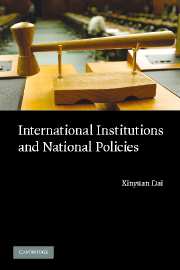Book contents
- Frontmatter
- Contents
- List of tables
- Acknowledgments
- 1 Introduction
- 2 The study of international institutions
- 3 Monitoring arrangements
- 4 Compliance mechanisms
- 5 The power of weak international institutions
- 6 Conclusion
- Appendix A Formal solutions
- Appendix B Ranking of signatory countries in LRTAP
- Bibliography
- Index
6 - Conclusion
Published online by Cambridge University Press: 22 September 2009
- Frontmatter
- Contents
- List of tables
- Acknowledgments
- 1 Introduction
- 2 The study of international institutions
- 3 Monitoring arrangements
- 4 Compliance mechanisms
- 5 The power of weak international institutions
- 6 Conclusion
- Appendix A Formal solutions
- Appendix B Ranking of signatory countries in LRTAP
- Bibliography
- Index
Summary
The central question in this book is, how do international institutions influence sovereign behavior? Rather than how international institutions influence states' compliance directly by enabling states to use carrots and sticks against each other, this book investigates how they do so indirectly through victims of noncompliance and domestic mechanisms. Although there is a growing interest in such indirect channels of influence by international institutions, scholars have not always thought theoretically and analytically about them. This book seeks to achieve greater theoretical clarity by specifying (1) how international institutions utilize victims of noncompliance in monitoring, (2) how states' compliance decisions respond to domestic constituencies, and (3) how international institutions facilitate states' compliance through domestic mechanisms. In so doing, it develops a theoretical framework to bring nonstate actors and domestic politics into the study of international institutions.
This chapter seeks to accomplish three tasks. First, I summarize key findings on how international institutions influence national policies. Second, I discuss the theoretical implications of this for the study of international relations. Third, I further explore policy implications for global governance.
NONSTATE ACTORS, DOMESTIC POLITICS, AND INTERNATIONAL INSTITUTIONS
This book argues that international institutions can influence states' compliance with international agreements through victims of noncompliance and domestic mechanisms. It advances this argument by resolving three related puzzles on international institutions.
- Type
- Chapter
- Information
- International Institutions and National Policies , pp. 140 - 151Publisher: Cambridge University PressPrint publication year: 2007

